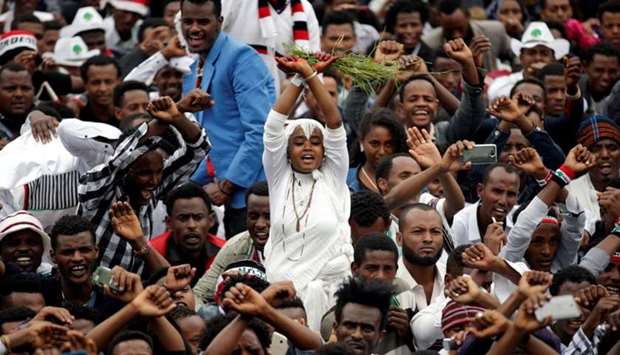The incident during the annual Irreecha festival in Bishoftu, which lies 40 km south of the capital Addis Ababa, marked the bloodiest period in unrest that plagued the Horn of Africa country for months in 2015 and 2016.
Authorities at the time said 55 had died in the stampede, while dissidents put the toll at around 150.
On Sunday, thousands of people attended the thanksgiving event that marks the end of the rainy season, a majority clad in red, black and white attire - the Oromiya region's flag.
Although the lakeside event ended without any violence, anti-government slogans rang out soon after the ceremony began.
"Down, down EPRDF!" dissidents chanted in small groups as they marched towards the town's centre, referring to Ethiopia's ruling party.
Earlier in the week, the regional government announced that police presence would be minimal and that those attending would not hold arms to prevent tensions.
The violence in 2015 and 2016 forced the government to impose a nine-month state of emergency that was only lifted in August.
The unrest was provoked by a development scheme for the capital Addis Ababa and turned into broader anti-government demonstrations over politics and human rights abuses.
It included attacks on businesses, many of them foreign-owned, including farms growing flowers for export.
In April, a government-sanctioned investigation said 669 people had been killed during one period in the violence and more than 29,000 people arrested.
The violence in Oromiya, the largest and most populous region which surrounds Addis Ababa, and to a lesser extent in the Amhara province north of the capital, cast a shadow over Ethiopia, where a rapid industrialisation drive has created one of Africa's fastest growing economies.

A demonstrator chants slogans while flashing the Oromo protest gesture during celebrations for Irreecha, the thanksgiving festival of the Oromo people, in Bishoftu town, Oromia region, Ethiopia
Hundreds of people chanting anti-government slogans marched in the central Ethiopian town of Bishoftu on Sunday at a religious festival where a stampede triggered by a police move to quell protests killed dozens of people last year.
